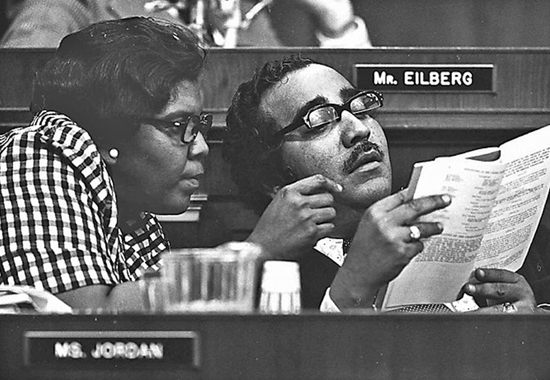|

"REASON AND NOT PASSION WHICH MUST
GUIDE OUR DECISION"
Opening Statement Nixon Impeachment
It follows the full text transcript of
Barbara C. Jordan's opening statement at the
U.S. House Judiciary Committee Impeachment Hearings, her
The Constitutional Basis for Impeachment speech, delivered at
Washington D.C. - July 25, 1974.

 |
Mr. Chairman, |
I join my
colleague Mr. Rangel in thanking you for giving
the junior members of this committee the
glorious opportunity of sharing the pain of this
inquiry. Mr. Chairman, you are a strong man, and
it has not been easy but we have tried as best
we can to give you as much assistance as
possible.
Earlier today we
heard the beginning of the Preamble to the
Constitution of the United States, "We, the
People." It is a very eloquent beginning. But
when that document was completed, on the
seventeenth of September in 1787, I was not
included in that "We, the People." I felt
somehow for many years that George Washington
and Alexander Hamilton just left me out by
mistake. But through the process of amendment,
interpretation, and court decision I have
finally been included in "We, the People."
Today I am an
inquisitor. I believe hyperbole would not be
fictional and would not overstate the solemnness
that I feel right now. My faith in the
Constitution is whole, it is complete, it is
total. I am not going to sit here and be an idle
spectator to the diminution, the subversion, the
destruction of the Constitution.
Who can so properly be the inquisitors for the
nation as the representatives of the nation
themselves? The subject
of its jurisdiction are those offenses which
proceed from the misconduct of public men. That
is what we are talking about. In other words, [the jurisdiction comes] from the abuse of
violation of some public trust. It is wrong, I
suggest, it is a misreading of the Constitution
for any member here to assert that for a member
to vote for an article of impeachment means that
that member must be convinced that the president
should be removed from office.
The Constitution
doesn't say that. The powers relating to
impeachment are an essential check in the hands
of this body, the legislature, against and upon
the encroachment of the executive. [In
establishing] the division between the two
branches of the legislature, the House and the
Senate, assigning to the one the right to accuse
and to the other the right to judge, the framers
of this Constitution were very astute. They did
not make the accusers and the judges the same
person.
We know the nature of impeachment. We have been
talking about it a while now. "It is chiefly
designed for the president and his high
ministers" to somehow be called into account. It
is designed to "bridle" the executive if he
engages in excesses. It is designed as a method
of national inquest into the public men. The framers
confined in the congress the power if need be,
to remove the president in order to strike a
delicate balance between a president swollen
with power and grown tyrannical, and
preservation of the independence of the
executive. The nature of impeachment is a
narrowly channeled exception to the
separation-of-powers maxim; the federal
convention of 1787 said that. It limited
impeachment to high crimes and misdemeanors and
discounted and opposed the term
"maladministration." "It is to be used only for
great misdemeanors," so it was said in the North
Carolina ratification convention. And in the
Virginia ratification convention: "We do not
trust our liberty to a particular branch. We
need one branch to check the others."
No one need be afraid.
The North Carolina ratification convention: "No
one need be afraid that officers who commit
oppression will pass with immunity."
"Prosecutions of impeachments will seldom fail
to agitate the passions of the whole community,"
said Hamilton in the Federalist Papers, number 65.
"We divide into parties more or less
friendly or inimical to the accused." I do not
mean political parties in that sense.
The drawing of political lines goes to the
motivation behind impeachment; but impeachment
must proceed within the confines of the
constitutional term, "high crime and
misdemeanors."
Of the impeachment process, it was Woodrow
Wilson who said that "nothing short of the
grossest offenses against the plain law of the
land will suffice to give them speed and
effectiveness. Indignation so great as to
overgrow party interest may secure a conviction;
but nothing else can."
Common sense would be revolted if we engaged
upon this process for petty reasons. Congress
has a lot to do: appropriations, tax reform,
health insurance, campaign finance reform,
housing, environmental protection, energy
sufficiency, mass transportation. Pettiness
cannot be allowed to stand in the face of such
overwhelming problems. So today we are not being
petty. We are trying to be big because the task
we have before us is a big one.
This morning, in a discussion of the evidence,
we were told that the evidence which purports to
support the allegations of misuse of the CIA by
the President is thin. We are told that that
evidence is insufficient. What that recital of
the evidence this morning did not include is
what the President did know on June 23, 1972.
The President did know that it was Republican
money, that it was money from the Committee for
the Re-Election of the President, which was
found in the possession of one of the burglars
arrested on June 17.
What the President did know on June 23 was the
prior activities of E. Howard Hunt, which
included his participation in the break-in of
Daniel Ellsberg's psychiatrist, which included
Howard Hunt's participation in the Dita Beard
ITT affair, which included Howard Hunt's
fabrication of cables designed to discredit the
Kennedy Administration.
We were further cautioned today that perhaps
these proceedings ought to be delayed because
certainly there would be new evidence
forthcoming from the President of the United
States. There has not even been an obfuscated
indication that this committee would receive any
additional materials from the President. The
committee subpoena is outstanding, and if the
President wants to supply that material, the
committee sits here.
The fact is that on yesterday, the American people
waited with great anxiety for eight hours, not
knowing whether their President would obey an
order of the Supreme Court of the United States.
At this point, I would like to juxtapose a few of
the impeachment criteria with some of the
actions the President has engaged in.
Impeachment criteria: James Madison, from the
Virginia ratification convention. "If the
president be connected in any suspicious manner
with any person and there be grounds to believe
that he will shelter him, he may be impeached."
We have heard time and time again that the
evidence reflects payment to the defendants of
money. The President had knowledge that these
funds were being paid and that these were funds
collected for the 1972 presidential campaign.
We know that the President met with Mr. Henry
Petersen twenty-seven times to discuss matters
related to Watergate and immediately thereafter
met with the very persons who were implicated in
the information Mr. Petersen was receiving and
transmitting to the President. The words are "if
the president be connected in any suspicious
manner with any person and there be grounds to
believe that he will shelter that person, he may
be impeached."
Justice Story: "Impeachment is intended for
occasional and extraordinary cases where a
superior power acting for the whole people is
put into operation to protect their rights and
rescue their liberties from violations."
We know about the Huston plan. We know about the
break-in of the psychiatrist's office. We know
that there was absolute complete direction in
August 1971 when the President instructed
Ehrlichman to "do whatever is necessary." This
instruction indicated that a surreptitious entry
had been made in Dr. Fielding's office after
[those breaking in] met with Mr. Ehrlichman and
Mr. Young.
"Protect their rights." "Rescue their liberties
from violation."
The [South] Carolina ratification convention
impeachment criteria: Those are impeachable "who
behave amiss or betray their public trust."
Beginning shortly after the Watergate break-in
and continuing to the present time, the
President has engaged in a series of public
statements and actions designed to thwart the
lawful investigation by government prosecutors.
Moreover, the President has made public
announcements and assertions bearing on the
Watergate case which the evidence will show he
knew to be false.
These assertions, false assertions; impeachable,
those who misbehave. Those who "behave amiss or
betray their public trust."
James Madison, again at the constitutional
convention: "A president is impeachable if he
attempts to subvert the Constitution."
The Constitution charges the president with the
task of taking care that the laws be faithfully
executed, and yet the President has counseled
his aides to commit perjury, willfully
disregarded the secrecy of grand jury
proceedings, conceal surreptitious entry,
attempt to compromise a federal judge, while
publicly displaying his cooperation with the
processes of criminal justice.
"A president is impeachable if he attempts to
subvert the Constitution."
If the impeachment provision in the Constitution
of the United States will not reach the offenses
charged here, then perhaps that eighteenth
century Constitution should be abandoned to a
twentieth-century paper shredder.
Has the President
committed offenses and planned and directed and
acquiesced in a course of conduct which the
Constitution will not tolerate? That is the
question. We know that. We know the question. We
should now forthwith proceed to answer the
question.
It is reason, and
not passion, which must guide our deliberations,
guide our debate, and guide our decision.
Mr. Chairman, I
yield back the balance of my time.

More History
|
|